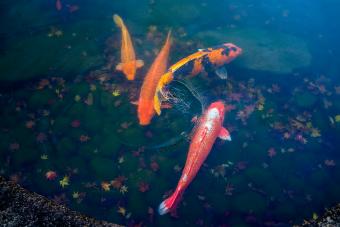
Discovering that one of your fish disappeared from their tank can be a huge shock. While it could be as simple as them hiding amongst the aquarium décor, other reasons are good to be aware of ASAP. This way, you can make sure your pet is safe and prevent it from happening to your other fishies.
1. Jumped Out of the Tank
Fish “jumpers” are more common than you might think. If you don’t have a secure lid on your tank, it’s possible your fish took the leap out of the aquarium. Carefully check the floor and any surfaces around the tank to see if you can find them there. Don’t forget to look behind it.
Fish can generally survive for only a short time out of the water. If they’re still alive when you locate them, place them in a small container containing tank water and watch them for a few hours before releasing them back into the main tank.
Some species, like Oscar fish, bettas, and tetras, are prone to jumping, but it’s important to have a secure lid no matter what fish species you keep.
2. Animals Scooped Them Out
Another risk of having a lidless tank is the possibility of an outside creature, like a pet cat or wild animal, in the case of outdoor ponds, catching your fish. Small critters are fascinated by beautiful, glittery fish and will go to great lengths to get their paws on one. Some have even been known to remove unsecured tank covers or lids. Tank clips are available for indoor tanks and screens are available for outdoor ponds to help keep your fish swimming pretty.
3. Hidden in the Aquarium Décor
With all those decorative castles and plants in your tank, there’s always a chance your fish could be hiding. Fish will hide for a few days while adjusting to a new environment, but sudden hiding could indicate a problem. If the water quality is poor, the tank is overcrowded, or the fish is sick, they might hide in and around things.
Carefully move your décor around (you can use this opportunity to thoroughly clean the tank) to see if you can locate your fish, then check all your water parameters to make sure they’re not trying to tell you something through their disappearance.
Pufferfish will “wallow,” which is where they bury themselves under the tank substrate. This can surprise a lot of owners into thinking their puffer has vanished.
4. Eaten by a Tankmate
If it’s a small fish that went missing, it’s possible a predatory fish got to them. Even fish that are known to be docile will eat other fish if they’re small enough. You’ll probably want to separate any remaining small fish and create two separate community tanks.
Was it a larger fish? It’s not impossible for them to be eaten by others. When a fish dies of illness or natural causes, it’s not uncommon for the others to cannibalize them.
Crabs, crayfish, and other aquatic creatures can eat smaller fish, too.
5. Caught in the Filter
Water filters are a vital part of an aquarium setup, but they can sometimes do harm as well. If the current is too strong, or if your fish is sick and can’t swim against it, they could get swept up into the filter. Take a look at your filtration tubes and throughout the system to see if that’s the case. If so, make sure your filter is the right size for your setup, and check your fish for signs of illness or injury.
How to Prevent Your Fish From Disappearing
Losing a fish never gets easier. Fortunately, there are things you can do to help prevent more fish from disappearing from your tank. Implement these tips to keep all your fishies happy and safe.
- Have a secure lid on your tank to prevent jumping and keep critters out.
- Make sure the filter is the appropriate size and strength for your tank.
- Use a pre-filter screen to prevent fish from getting swept up into the filter.
- Keep your water parameters within the ideal range.
- Make sure the tank is properly oxygenated.
- Be mindful of what fish species you keep together to prevent bullying or cannibalism.
- Avoid overcrowding your tank.
Finding Your Missing Fish
Time is of the essence when your fish go missing. Use these tips to help locate your fish as soon as you can to increase their chances of survival, then take precautions to protect your other fish and keep them safe.







